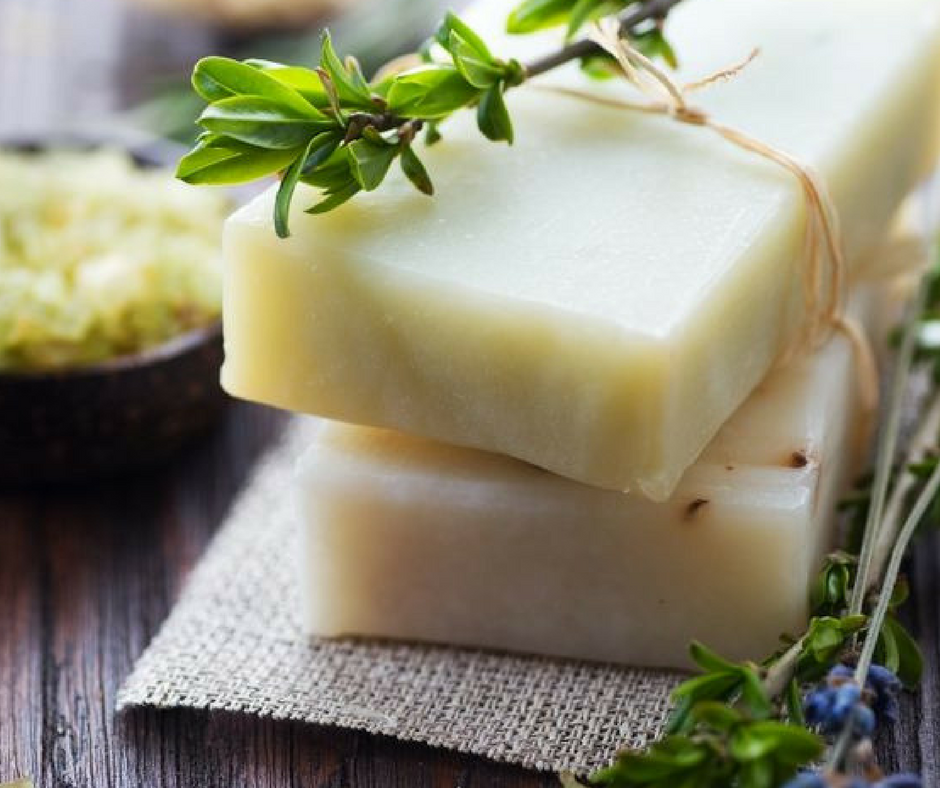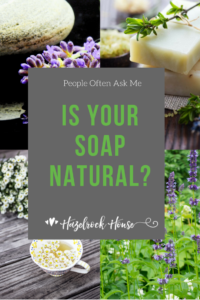People often ask me…Is your soap natural?
That is a difficult question.
I want to say yes to this; to reassure people that my soap doesn’t contain harmful ingredients. I use ingredients that are common, minimally processed and you don’t need a degree in chemistry to pronounce the names. I use mainly essential oils to scent my soap, I use pigment colours to colour them and I don’t use preservatives like parabens.
In reality, I have to say no. Strictly speaking, they are not natural. In fact, no soap is.
The Oxford English Dictionary defines the term natural as ‘Existing or derived from nature; not made or caused by humankind’
As soap does not exist by itself in nature, it is not natural. It is made by humankind.
That is not really what my customers are talking about. Natural has come to mean something different than the dictionary definition. I think everyone accepts that even things that are derived from nature need to have a bit of processing by humans if just to remove impurities or to standardise concentrations. Natural has become a word overused in advertising and marketing which really doesn’t mean much anymore. Each person has their own idea of what is natural which may be different than another.
People are really asking if the soap is safe for their skin.
So let’s go through the ingredients we use here at Hazelrock House and I’ll tell you all about them.
Sodium Hydroxide aka Lye.
Yes, we do use this caustic and very harsh substance in our soap. It is definitely not natural. However, it is a key component in the chemical reaction that creates soap. Soap cannot be made without it. Once the chemical reaction of the Sodium Hydroxide is completed there will be none left in the soap. In fact, we add extra oils to ensure this is the case.
The traditional way of making a lye solution was to wash wood ash with water and keep the resulting liquid. There was no way of accurately judging how much Sodium Hydroxide was actually in this solution and the resulting soap was generally quite harsh and drying. Nowadays because our Sodium Hydroxide is made in a chemical production factory, we can be sure of the concentration and make sure there is no extra Sodium Hydroxide in the soap. And we can be confident that there are no other impurities contained in it. We are better equipped to make a safer soap that way. And it is a lot more convenient to use!
Soapmaking Oils.
Soapmakers generally use a wide variety of oils in their soap and each will have spent many years developing their own recipe. Oils can be extracted from plants and animals in a few different ways. At Hazelrock House we prefer to use plant oils as they are easy to source, easy to use and will appeal to everyone including vegetarians and vegans. We don’t use organic oils at present due to their high cost.
We do use palm oil in our soap as we have a reliable source of sustainably farmed palm and so we don’t affect the habitat of the Orang-Utan. We support the palm oil workers by demanding sustainably produced palm oil rather than not using it at all. We would like to see reform of the palm industry rather than the industry destroyed and many local workers out of work with no way of supporting their families. We feel that palm adds a fantastic quality to our soap which cannot be replaced by any other oil even after 8 years of testing.
We use around 8% extra oils in our soap. This is to ensure that all the Sodium Hydroxide is used up in the reaction. The extra oil also leaves a protective film of oil on your skin after washing, like a lotion, which moisturises, nourishes and protects the skin.
Fragrance.
Many people ask if we use synthetic fragrances in our soap. We mostly use essential oils but for some types of fragrance there are no essential oils, so we use skin safe fragrances instead.
Yes, it is true that essential oils are more ‘natural’, by that I mean they are at least derived from nature. It does not follow that essential oils are better for your skin. Essential oils can be very potent and can contain a large number of allergens which may irritate the skin. Synthetic fragrances too may contain allergens but we stay clear of the allergen-heavy ones. In fact, some of our synthetic fragrances contain no allergens at all. Less likely to irritate than many essential oils.
All our fragrances and essential oils are sourced in the UK, tested to ensure that they contain only skin safe ingredients. But never tested on animals.
If you do find you are irritated by handmade soap, it might be worth finding out which allergen you are sensitive to. That way you can stay clear of that allergen. All allergens in soap made in Europe must be listed on the packaging and all are only allowed in tiny quantities. If you inform yourself you can still enjoy handmade soap even if you have sensitive skin.
We always carry at least one soap which is fragrance-free just in case!
Colourants.
Soap can be coloured in many different ways, both with ‘natural’ or synthetic colours. When we refer to synthetic colours we are really talking about dyes made in a factory. Some of these are in small enough particles to penetrate the skin, which isn’t really desirable in your soap.
‘Natural’ colours can be clays or plant extracts and infusions. Some plant extracts fade over time in soap. Some morph into different colours. They all have their advantages and disadvantages.
Clays are fantastic and we use them a lot in our soap. Other semi-naturals we use are oxides and ultramarines. Traditionally these compounds would have been mined from the ground but now are made in a lab or factory.
Making them synthetically ensures that there are no impurities like the mined ones would have contained. So not natural but nature identical.
Other things we use are spirulina, seaweed, cocoa powder, herbal infusions and spices. All the colours we use have particles too large to go through the skin barrier and so just get washed down the sink. They don’t stain your skin or your shower. Or your conscience.
Preservatives.
We don’t use them because we don’t need them. So you won’t find any parabens or other preservatives in our soap.
The Cold Process.
Commercial soap is made in a very automated and harsh way, with the soap being boiled and filtered and all the glycerine produced as a result of the reaction drained away. This can result in a harsh, drying soap.
We use the Cold Process Method where our soap is reacted at much lower temperatures, so as to keep as much of the properties of the oils, herbs and essential oils as possible. We keep all the glycerine in the soap so it can soften and soothe your skin.
All of our soap is made in small batches which means we are present for the making of every single one and we can then ensure the absolute top-notch quality of each bar.
Each of our bars is cured for 4-6 weeks before being packaged, to finish the chemical reaction that has taken place and also so some of the water used can evaporate making a harder and longer lasting bar.
Other ingredients such as Tetrasodium EDTA, Propylene Glycol, SLS, SLSA and much more.
We don’t use them because we don’t need them. We don’t need any fillers or artificial detergents, everything we use has a reason to be there and we don’t need to pad them out with other cheap ingredients. Our soap is only made from quality stuff!
So back to the original question.
Is your soap Natural?
My soap is made with care, using quality, responsibly sourced ingredients, in a gentle way, with naturally derived and minimally processed ingredients where possible. When I use non-naturally sourced ingredients, I do so because they are the best and the safest.
No soap is Natural.


